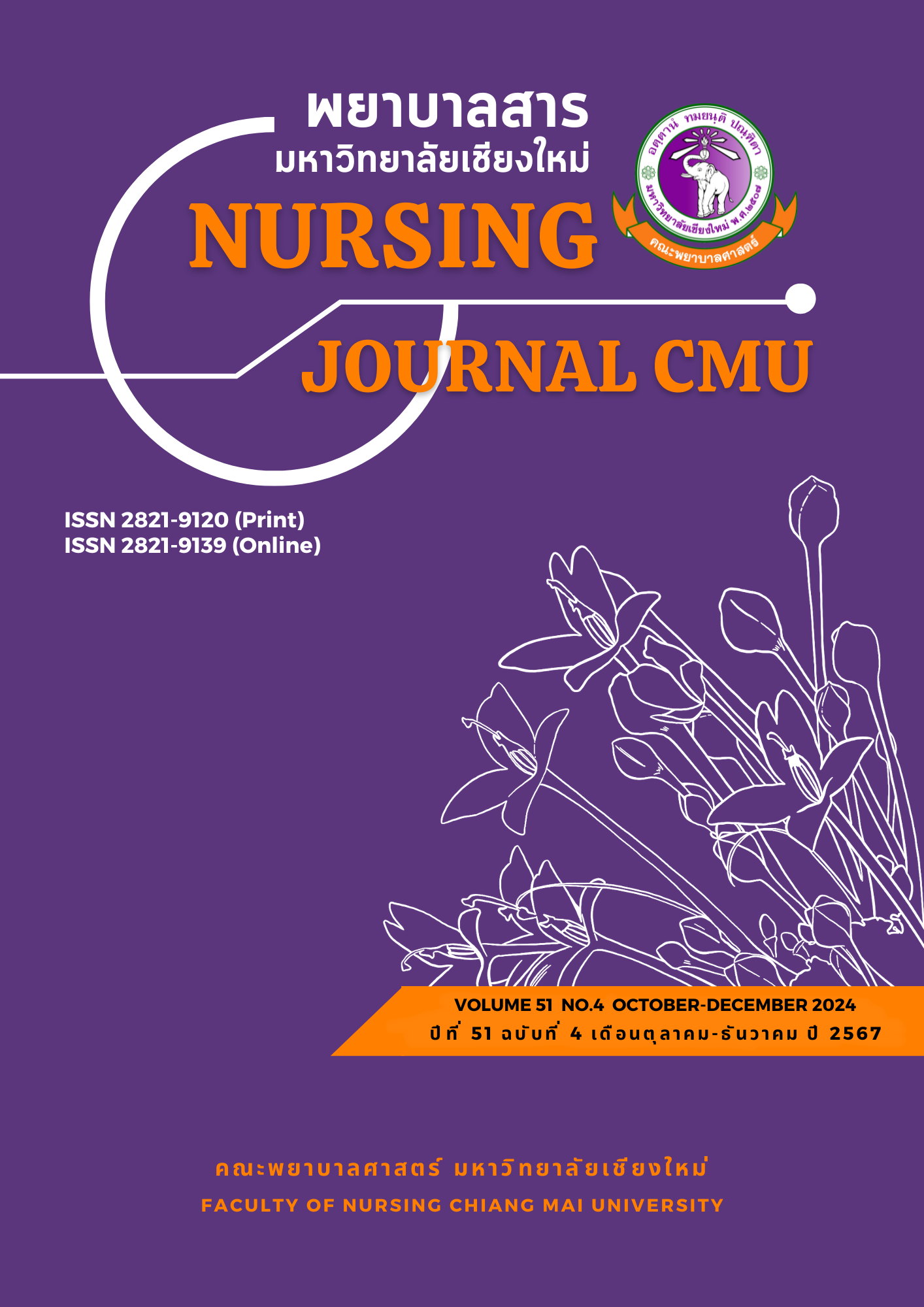ผลของการสอนโดยใช้เทคโนโลยีเป็นฐานต่อความรอบรู้ด้านสุขภาพ ในพระสงฆ์สูงอายุโรคความดันโลหิตสูง
คำสำคัญ:
การสอนโดยใช้เทคโนโลยีเป็นฐาน, ความรอบรู้ด้านสุขภาพ, พระสงฆ์สูงอายุ, โรคความดันโลหิตสูงบทคัดย่อ
โรคความดันโลหิตสูงพบอุบัติการณ์สูงในพระสงฆ์สูงอายุ การสอนด้วยเทคโนโลยีเป็นฐาน อาจช่วยให้พระสงฆ์สูงอายุโรคความดันโลหิตสูงมีความรอบรู้ด้านสุขภาพดีขึ้น การวิจัยเชิงทดลองครั้งนี้ มีวัตถุประสงค์เพื่อศึกษาผลของการสอนโดยใช้เทคโนโลยีเป็นฐาน ต่อความรอบรู้ด้านสุขภาพในพระสงฆ์สูงอายุโรคความดันโลหิตสูง กลุ่มตัวอย่าง 54 ราย คัดเลือกแบบสุ่มอย่างง่าย จากพระสงฆ์สูงอายุที่ได้รับการวินิจฉัยเป็นโรคความดันโลหิตสูง ที่มารับบริการในโรงพยาบาลส่งเสริมสุขภาพตำบล เขตบริการอำเภอเมือง จังหวัดนครสวรรค์ สุ่มเข้ากลุ่มควบคุมและกลุ่มทดลองกลุ่มละ 27 ราย โดยกลุ่มทดลองได้รับโปรแกรมการสอนโดยใช้เทคโนโลยีแบบกลุ่มและแบบรายบุคคล จำนวน 5 ครั้ง ระยะเวลารวม 3 สัปดาห์ ส่วนกลุ่มควบคุมได้รับการดูแลตามปกติ เครื่องมือที่ใช้ในการเก็บรวบรวมข้อมูล ได้แก่ 1) แบบสัมภาษณ์ข้อมูลส่วนบุคคลและข้อมูลความเจ็บป่วย และ 2) แบบสัมภาษณ์ความรอบรู้ด้านสุขภาพของพระสงฆ์สูงอายุโรคความดันโลหิตสูง โดยโปรแกรมการสอนด้วยเทคโนโลยีเป็นฐานเพื่อส่งเสริมความรอบรู้ด้านสุขภาพได้ผ่านการตรวจสอบความตรงตามเนื้อหาจากผู้ทรงคุณวุฒิ 5 ท่าน และผู้วิจัยนำแบบสัมภาษณ์ความรอบรู้ด้านสุขภาพของพระสงฆ์สูงอายุโรคความดันโลหิตสูง ไปทดสอบหาค่าความเชื่อมั่นแบบความสอดคล้องภายใน ได้ค่า Cronbach's correlation coefficient เท่ากับ .85 วิเคราะห์ข้อมูลด้วยสถิติเชิงพรรณนา สถิติ independent t-test และ dependent t-test
ผลการวิจัยพบว่า ภายหลังได้รับโปรแกรมการสอนโดยใช้เทคโนโลยีเป็นฐาน ค่าเฉลี่ยคะแนนความรอบรู้ด้านสุขภาพของกลุ่มทดลอง (M = 45.41, SD = 2.64) มากกว่ากลุ่มควบคุมที่ได้รับการดูแลตามปกติ (M = 19.93, SD = 3.03) อย่างมีนัยสำคัญทางสถิติ (t = 33.01, p < .001) และมากกว่าก่อนได้รับโปรแกรม (M = 20.74, SD = 3.21) อย่างมีนัยสำคัญทางสถิติ (t = -46.68, p < .001)
สรุปได้ว่า การสอนโดยใช้เทคโนโลยีเป็นฐานช่วยส่งเสริมความรอบรู้ด้านสุขภาพ บุคลากรสุขภาพสามารถประยุกต์ใช้โปรแกรมการสอนโดยใช้เทคโนโลยีเป็นฐานในการส่งเสริมความรอบรู้ด้านสุขภาพในพระสงฆ์สูงอายุโรคความดันโลหิตสูงได้
เอกสารอ้างอิง
Arahung, R., Hoontrakul, S., & Roojanavech, S. (2018). The effects of health literacy enhancement program on hypertensive prevention behavior of pre-hypertension risk group at a community in Nakhon Pathom Province. Royal Thai Navy Medical Journal, 45(3), 509-526. (in Thai)
Burns, N., & Grove, S. K. (2009). The practice of nursing research: Appraisal, synthesis, and generation of evidence (6th ed.). Elsevier.
Chiangmai Provincial Public Health Office. (2018). Health screening guide for the elderly with health promotion. Chiangmai Provincial Public Health Office. (in Thai)
Chotjirawatthana, S., Tantrarungroj, P., & Suwanmonkma, S. (2021). Technology utilization model to promote health literacy in the learning resource center for the elderly. Kasetsart Journal of Social Sciences, 42(3), 535-541. (in Thai)
Codrington, S., Panuthai, S., & Khampolsiri, T. (2021). Health literacy and self- management among elderly monks with hypertension. Nursing Journal, 48(4), 268-280. (in Thai)
Darwis, S., Russeng, S. S., & Amiruddin, R. (2021). Intervention based on integration of health literacy and health outcomes in hypertension “a systematic review”. Open Access Macedonian Journal of Medical Sciences, 9(F), 486-491.
Department of Health. (2022). Health status of the group of monks and novices. https://hdcservice.moph.go.th/hdc/reports/page.php (in Thai)
Department of Medical Services. (2014). Guideline for screening/evaluating seniors. Office of the Printing Service for the Veterans Organization.
Department of Medical Services Priest Hospital. (2021). Annual report 2020 priest hospital. https://www.priest-hospital.go.th/report/reportYear
Janchai, N., & Deoisres, W. (2020). Factors affecting health literacy in hypertensive elder adults: An integrative review. Thai Journal of Cardio-Thoracic Nursing, 31(1), 17-26. (in Thai)
Nutbeam, D. (2000). Health literacy as a public health goal: A challenge for contemporary health education and communication strategies into the 21st century. Health Promotion International, 15(3), 259-267.
Nutbeam, D. (2008). The evolving concept of health literacy. Social Science & Medicine, 67(12), 2072–2078. https://doi.org/10.1016/j.socscimed.2008.09.050
Pfeiffer, E. (1975). A short portable mental status questionnaire for the assessment of organic brain deficit in elderly patients. Journal of the American Geriatrics Society, 23(10), 433-441.
Srithong, K., Jearajit, C., Suksatit, B., & Promjittiphong, C. (2021). Health literacy situation of monks in Thai society. Journal of MCU Peace Studies, 9(5), 1793-1804. https://so03.tci-thaijo.org/index.php/journalpeace/article/view/254370 (in Thai)
Stewart, M. N. (2012). Practical patient literacy: The medagogy model. McGraw-Hill Medical.
Weber, M. A., Schiffrin, E. L., White, W. B., Mann, S., Lindholm, L. H., Kenerson, J. G., Flack, J. M., Carter, B. L., Materson, B. J., Ram, C. V., Cohen, D. L., Cadet, J. C., Jean-Charles, R. R., Taler, S., Kountz, D., Townsend, R. R., Chalmers, J., Ramirez, A. J., Bakris, G. L., … Harrap, S. B. (2014). Clinical practice guidelines for the management of hypertension in the community: A statement by the American Society of Hypertension and the International Society of Hypertension. Journal of Clinical Hypertension (Greenwich), 16(1), 14-26. https://doi.org/10.1111/jch.12237
Yakong, N., Panuthai, S., & Suwankruhasn, N. (2022). Effect of PITS-based education on health literacy among older persons with type-2diabetes. Nursing Journal CMU, 49(3), 70-82.(in Thai)
ดาวน์โหลด
เผยแพร่แล้ว
รูปแบบการอ้างอิง
ฉบับ
ประเภทบทความ
สัญญาอนุญาต
ลิขสิทธิ์ (c) 2024 พยาบาลสาร มหาวิทยาลัยเชียงใหม่

อนุญาตภายใต้เงื่อนไข Creative Commons Attribution-NonCommercial-NoDerivatives 4.0 International License.
บทความที่ได้รับการตีพิมพ์เป็นลิขสิทธิ์ของวารสารพยาบาลสาร
ข้อความที่ปรากฏในบทความแต่ละเรื่องในวารสารวิชาการเล่มนี้เป็นความคิดเห็นส่วนตัวของผู้เขียนแต่ละท่านไม่เกี่ยวข้องกับมหาวิทยาลัยเชียงใหม่ และคณาจารย์ท่านอื่นๆในมหาวิทยาลัยฯ แต่อย่างใด ความรับผิดชอบองค์ประกอบทั้งหมดของบทความแต่ละเรื่องเป็นของผู้เขียนแต่ละท่าน หากมีความผิดพลาดใด ๆ ผู้เขียนแต่ละท่านจะรับผิดชอบบทความของตนเองแต่ผู้เดียว






